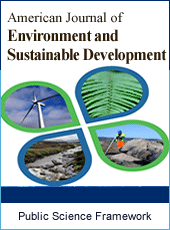American Journal of Environment and Sustainable Development
Articles Information
American Journal of Environment and Sustainable Development, Vol.6, No.3, Sep. 2021, Pub. Date: Sep. 21, 2021
Impact of Management Practices on the Sustainability of (IDP) Model Villages in Rwanda: Case of Rweru Sector Bugesera District
Pages: 107-117 Views: 1848 Downloads: 1557
[01]
Frank Rutehenda, Department of Environmental Economics and Natural Resources Management, Faculty of Environmental Studies, University of Lay Adventists of Kigali, Kigali, Rwanda.
[02]
Abias Maniragaba, Department of Environmental Economics and Natural Resources Management, Faculty of Environmental Studies, University of Lay Adventists of Kigali, Kigali, Rwanda.
The objective of this background paper is to review the Impact of Management Practices on the Sustainability of the Integrated Development Programme (IDP) model villages in Rwanda that cover the last 21 years from 2006 to 2021. The paper looks at the difficulties that the approach encountered and lessons learnt to sustain the integrated development model villages in Rwanda. The paper looks at the different approaches that have evolved since 2006 to support Rwandans both in rural and urban areas towards the implementation of the IDP model and how the model villages have been incorporated in the design and implementation of the resettlement plans in Rwanda, However, the findings were; there has been a rapid increase in household biomass energy consumption which has been occurring recently in the study area. This involved critical shortage or total lack in some cases of other energy alternatives. Biomass (firewood & charcoal) remains practically the only source for cooking for many years to come as electricity will remain too expensive in the medium future. It has been observed that sewages are poorly disposed of and the impacts of untreated sewage and wastewater cause risks to humans by causing water-borne disease. Also, the level of the private sector in upgrading unplanned settlements and resettling people living in high-risk zones with poor environmental conditions are not reflected and thus the sustainability of the model villages is will not be achieved. This paper finally answered that management practices are partially applied to the IDP model villages in Rwanda and a need to sustainably manage them is needed by either, raising the level of private-sector resource mobilization for urbanization and the rural settlement calls for devising innovative ways for partnership with the private sector by ensuring that capacities and mechanisms to tap into urban finances from the private sector or designing programs and projects to support their functionality as a means of putting much emphasis to cater for them by transforming Rwanda into an urbanized country as per the National Strategy for Transformation NST1 (2018-2024).
Management Practices, Sustainability, IDP Model Villages
[01]
Aluko, O. (2010). Rule of law, planning and sustainable development in Nigeria. Journal of sustainable development in Africa, 12 (7), 88-95.
[02]
Gangopadhyay, D., Mukhopadhyay, A. K. and Singh, P., 2008. Rural development: A strategy for poverty alleviation in India. India Science and Technology (Online).
[03]
GoR (2017): National Informal Urban Settlement Upgrading Strategy.
[04]
GoR, 7 Years Government Programme: National Strategy for Transformation (NST 1, 2018 – 2024).
[05]
Madzivhandila, T. S. and Asha, A. A., 2012. Integrated development planning process and service delivery challenges for South Africa's local municipalities. Journal of Public Administration, 47 (si-1), pp. 369-378.
[06]
McNamara, R. S., 1975. Urban poverty in developing countries: A World Bank analysis. Population and Development Review, 1 (2), pp. 339-346.
[07]
Muremyi, R., Dominique, H., Niragire, F., Ignace, K. and Abayisenga, S., 2021. Analysis of the effect of health insurance on health care utilization in Rwanda: a secondary data analysis of Rwanda integrated living condition survey 2016-2017 (EICV 5). PAMJ-One Health, 4 (10).
[08]
Pearce, D., & Atkinson, G. (1998). The concept of sustainable development: An evaluation of its usefulness ten years after Brundtland. Revue Suisse d’Economie Politique et de Statistique, 134, 251-270.
[09]
Pradhan, S. and Ranjan, A., 2011. Corporate social responsibility in rural development sector: Evidences from India. School of Doctoral Studies (European Union) Journal, 2, pp. 139-147.

ISSN Print: Pending
ISSN Online: Pending
Current Issue:
Vol. 6, Issue 4, December Submit a Manuscript Join Editorial Board Join Reviewer Team
ISSN Online: Pending
Current Issue:
Vol. 6, Issue 4, December Submit a Manuscript Join Editorial Board Join Reviewer Team
| About This Journal |
| All Issues |
| Open Access |
| Indexing |
| Payment Information |
| Author Guidelines |
| Review Process |
| Publication Ethics |
| Editorial Board |
| Peer Reviewers |


